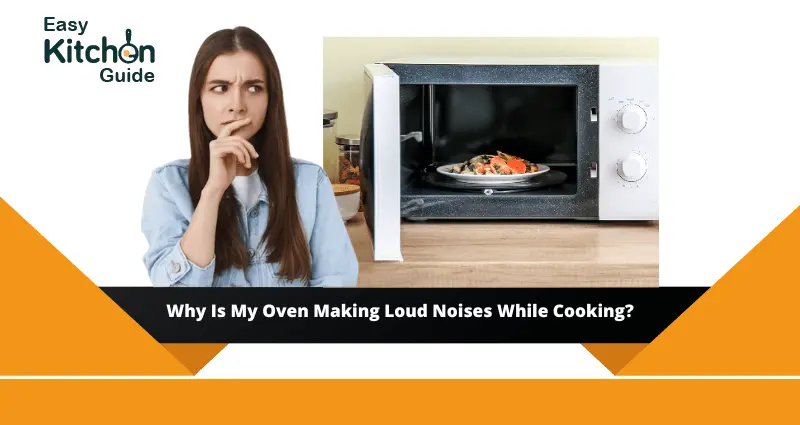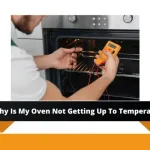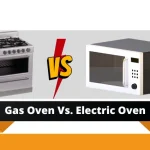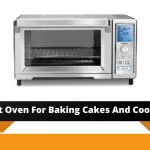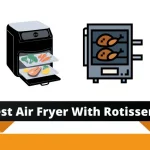As a home cook, I can understand that there’s nothing more frustrating than trying to prepare a delicious meal while being interrupted by loud and distracting noises from your oven. Unexpected sounds ruin our kitchen experience, whether baking cookies or roasting a chicken. Leave you asking, “Why is my oven making loud noises while cooking?”
The leading causes of oven noises, from creaking doors to buzzing gas oven valves, leave an unpleasant cooking experience. Sometimes, these issues indicate the faults of oven elements resulting in under and over-cooked food and being hazardous to use. Therefore these noises ask your attention to repair them before using them again.
It’s important to understand the reasons behind these noises to troubleshoot the problem and avoid any potential safety hazards. This article dives into the common reasons for noise in electric and gas ovens while cooking and provide possible solutions so you can get back to cooking in peace. It also gives you a better understanding of whether or not it’s time to call in a professional for repairs.
Noises from Electric Ovens: Common Issues and Solutions
Table of Contents,
Electric ovens produce various noises during cooking due to various issues. Some common problems and their potential solutions are described below:
1- Rattling or Vibrating Noise:
When you hear a rattling or vibrating noise while using your electric oven, it could be due to a loose or damaged fan or heating element. You can inspect the fan or heating element by first turning off the oven and unplugging it, then removing the back panel. Check for any loose parts or damage and tighten or replace them as necessary.
2- Clicking Noise:
A clicking noise usually indicates a faulty thermostat or a faulty relay. You can inspect by turning off and unplugging the oven and removing any covers or panels to access the internal components. Look for any loose or damaged parts, such as a loose heating element or a damaged fan. Tighten or replace any damaged parts as necessary.
Sometimes, the clicking noise may be due to the oven’s timer or self-cleaning function. Check the oven’s user manual to determine if these features may be causing the noise, and adjust or disable them as necessary. If the clicking noise persists after inspecting and repairing damaged components or adjusting the oven’s features, it may indicate a more serious issue. In this case, it is best to call a professional technician to diagnose and repair the oven.
3- Grinding or Screeching Noise:
If you hear a grinding or screeching noise while using your oven, it may be due to a faulty motor or worn bearings. First, Turn off the oven, unplug it, remove the back panel, and inspect the motor and bearings. If they are damaged or worn, replace them.
4- Humming Noise:
A humming noise may indicate that the fan is running, but there is an obstruction in the air vent. Turn off the oven and unplug it, then remove the back panel and inspect the fan and air vent for any debris. Clean out any debris and replace any damaged parts.
Note: It is important always to turn off and unplug the oven before inspecting or attempting to repair any parts. If you are unsure about any aspect of the inspection or repair process, it is best to call a professional technician to assist you.
Electric Oven Maintenance Tip: Regular maintenance of your electric oven helps prevent issues from occurring. Clean the oven regularly and check for any signs of damage or wear. Any unusual noises or issues is the sign of alertness; address these noises promptly to prevent further damage and ensure the safe operation of your oven.
Noises from Gas Ovens: Common Issues and Solutions:
1- Clicking Noise:
A clicking noise that works when your turn on the oven. It indicates that the ignition system is working properly to light the gas burner. However, if the clicking noise persists even after lightening the burner, it is due to a faulty ignition switch or a dirty igniter.
For inspection, after turning it off and unplugging it. Remove any covers or panels to access the internal components, and look for any loose or damaged parts. Check the igniter and ignition switch for any damage or dirt buildup, and clean or replace them as necessary.
In case, If the clicking noise continues after inspecting and repairing any damaged components or cleaning the igniter, it is best to call a professional technician to fix the issue.
2- Hissing Noise:
A hissing noise may indicate a gas leak. If you smell gas or hear a hissing noise, turn off the oven immediately, open all windows and doors to ventilate the area, and call your gas company or a professional technician for assistance.
However, if the hissing noise is not due to a gas leak, it indicates a problem with the oven’s gas regulator or valve. In this case, it is important to turn off the oven, unplug it, and remove any covers or panels to access the internal components. Inspect the gas regulator and valve for any damage or dirt buildup, and clean or replace them as necessary.
3- Whistling or Squealing Noise:
A whistling or squealing noise in an oven indicates a problem with the fan or blower motor. The fan or blower motor circulates hot air throughout the oven cavity to ensure even cooking and baking.
To inspect the oven for the source of the noise, it is essential to turn off and unplug the oven. Remove any covers or panels to access the fan and blower motor, and inspect them for any damage or obstruction.
Check if debris or food particles obstruct the fan or blower motor. Carefully clean them using a soft brush or cloth. Be sure to wear protective gloves to avoid injury.
If the fan or blower motor is damaged or worn, it may need to be replaced. It is essential to seek help with the manufacturer’s instructions and safety guidelines when repairing or replacing electrical components.
In that case, If the noise persists after inspecting and repairing the fan. It is best to call a professional technician to diagnose and repair the issue to ensure the safe operation of the oven.
4- Rattling Noise:
Various issues are responsible for causing the rattling noise in a gas oven. One possible cause is loose or damaged oven racks or other components inside the oven cavity.
To inspect the oven for the source of the rattling noise, it is essential to turn off and unplug the oven. Remove any covers or panels to access the internal components, and inspect the oven racks and other parts for any damage or looseness. Tighten or replace any damaged components as necessary.
Another possible cause of a rattling noise in a gas oven is a loose or damaged gas burner or grate. Check the burners and grates for any damage or looseness, and tighten or replace them as necessary.
If the rattling noise persists after inspecting and repairing damaged components or tightening loose parts, consult a professional technician to diagnose and repair the issue.
Note: It is vital always to turn off the oven and shut off the gas supply before inspecting or attempting to repair any parts. If you smell gas or suspect a gas leak, do not attempt to inspect or repair the oven yourself. Call your gas company or a professional technician for assistance.
Gas Oven Maintenance Tip: Regular maintenance of your gas oven can help prevent issues from occurring. Clean the oven regularly and check for any signs of damage or wear. If you notice any unusual noises or issues, address them promptly to prevent further damage and ensure the safe operation of your oven.
You May Also Read:
- Why Is My Oven Not Getting Up To Temperature?
- Gas Oven Vs. Electric Oven-(Which is Best?)
- Pick The Best Oven For Rental Property
FAQs
There are several potential reasons why your Whirlpool Gold oven makes a loud vibrating noise. One possibility is an issue with the fan motor or the fan blade. Another possibility is that the oven is not sitting level on the ground, causing it to vibrate when it is in use. It is also possible that there is a problem with the heating element, which could be causing the noise.
If your Whirlpool Gold oven produces a loud vibrating noise, you can try various fixes depending on the underlying issue. The problem may arise from a malfunctioning fan or motor, necessitating replacing faulty parts. In contrast, loose or worn-out components can be tightened or replaced to eliminate the issue. You should also inspect the gas line and electrical wiring to ensure the connections are secure and undamaged. Remember that it is necessary to diagnose the problem accurately to avoid causing further damage or injury.
The popping noise you hear when you put food in the microwave is due to moisture in the food. When microwaves penetrate the food, they excite the water molecules, causing them to vibrate and generate heat. As the heat builds up, the moisture turns into steam and expands steam rapidly, creating small explosions that produce a popping sound. This is why you often hear the noise more frequently when heating foods with high water, such as vegetables, soup, or popcorn. While the popping noise is harmless, following proper microwave heating guidelines is essential to avoid overheating and burning your food or causing damage to the microwave.

